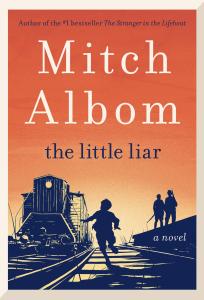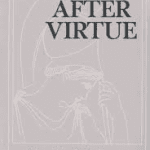Truth be Told
A week or so ago Jeanne needed to go to a department store to make a clothing purchase related to an upcoming work event. There are few things less attractive to me than following Jeanne around in a department store (or a store of any sort), but the store she was driving to is in a shopping center where a Barnes and Noble is just a couple of stores down. I seldom go to a real bookstore anymore, so I told Jeanne I would ride along and hang out with my best friends while she shopped.

I seldom am looking for anything in particular on such an excursion. Rather, I am waiting for some book to jump in front of me and say, “BUY ME!” After a half hour of wandering around, I concluded that no purchases were going to be made. Then I saw Mitch Albom’s 2023 novel The Little Liar begging to be purchased. I read the first ten pages or so accompanied by an iced coffee until Jeanne showed up—that was enough to convince me that this was going to be my first post-semester summer read. I recommend it.
In many ways, The Little Liar reminds me of Marcus Zusek’s 2007 novel The Book Thief. Both are set during WWII and the Holocaust. Both stories are told by unexpected narrators. The narrator of The Book Thief is Death, the Grim Reaper, while the narrator of The Little Liar is Truth. Toward the end of Albom’s story, Truth observes how many different expressions human beings have for truth.
“To tell you the truth,” people say. Or “Can I be honest with you?” or “honestly” or “truthfully” or “no lie” or “the fact is” or “the sad truth” or “the undisputed truth” or the truth of the matter is . . .
Truth goes on to list truth-related sayings in French, Spanish, German, and Greek. But Truth’s favorite truth-related expression is “truth be told.” Not as in “truth be told, if I’m being honest . . .” but rather as a command or imperative. “You can imagine a king declaring it. A mother demanding it. The Almighty decreeing it.”
In a world of alternative facts, a world in which partisan propaganda and truth are often synonymous, the imperative to tell the truth has a dated, almost quaint feeling to it. And yet almost everyone would agree that verisimilitude is a standard worth striving for. My summer writing project is a return after eighteen months to Nice Work if You Can Get It, a teaching memoir that I’ve been working on at various times since before the pandemic. My primary sabbatical project in the fall of 2023 was to get a complete draft of this book finished, and I did. But my other sabbatical book project was grabbed by a publisher in early 2024, and it has been my front-and-center writing focus ever since.
That book is coming out in October—just about everything I need to do with it is finished. So back to the memoir. In the front material for the book, after the Table of Contents, Dedication, and Epigraph, I have a To the Reader page that includes this:
To borrow a sentiment from “The Moth,” the following stories are true as remembered by the storyteller (me). Although there is a certain linear progression to the chapters, they don’t have to be read in any particular order . . .Think of the parts of this book as puzzle pieces. They can be joined together in any order, but once all of the pieces have been considered, hopefully a coherent picture will have been assembled.
A memoir is very different from a “just the facts, ma’am” linear report of stuff that happened. It is much more like a collage or a puzzle. The process is complicated even further when some of the pieces are a few decades old, or quite recent but tangled inextricably with other pieces of memory that won’t make the cut into the book.
I’ll be spending time reading the book aloud over the next few days. Note to fellow writers—I’ve found this to be the best way to catch needed corrections and adjustments along the way. It will take me a while, since the book is currently 90000 words long. I’ll probably be cutting a bit. Since this is largely a storytelling book, I’ll be encountering stories that I have told many times for the first time in a year and a half. I have no doubt that I’ll have forgotten some details already written and might remember some others that I’ll add in. I also have no doubt that someone who is part of a particular story might remember the events very differently. Such is the nature of memory and truth-telling.
It is helpful to keep such matters in mind when reading texts that are supposedly about the same events but report them in very different, sometimes contradictory ways. Take the four canonical gospels, for instance. The first three are called the “synoptic” gospels because they appear to be presenting “synopses” of the highlights of Jesus’ life and ministry. Scholars believe that Matthew and Luke were both using Mark’s earlier text as a spine for their narratives, yet Mark says nothing about the birth and early life of Jesus while Matthew’s and Luke’s account of events surrounding the nativity are very different. Although they share many similarities, there are some crucial differences. The fourth gospel is a different animal altogether; John is clearly trying to do something else with some Jesus stories woven in, including some important stories such as the wedding at Cana and the raising of Lazarus that the synoptic gospels don’t even mention.
Attempts have been made over the centuries to meld the four gospels into one seamless narrative but have usually been abandoned. Those responsible for putting the canon together clearly had no problem with presenting four very different narratives of the life of Jesus—that’s why each is called “The Gospel according to . . .” Perhaps each should begin with a disclaimer such as “The Moth” uses to discourage readers and believers from insisting that any one narrative is the “true” one.
As Alasdair MacIntyre tells us, human beings are storytelling animals. Don’t ever let anyone steal your story by saying that “it didn’t happen that way.” If you are the storyteller and the story being told is yours as you remember it, it is true. End of story.













